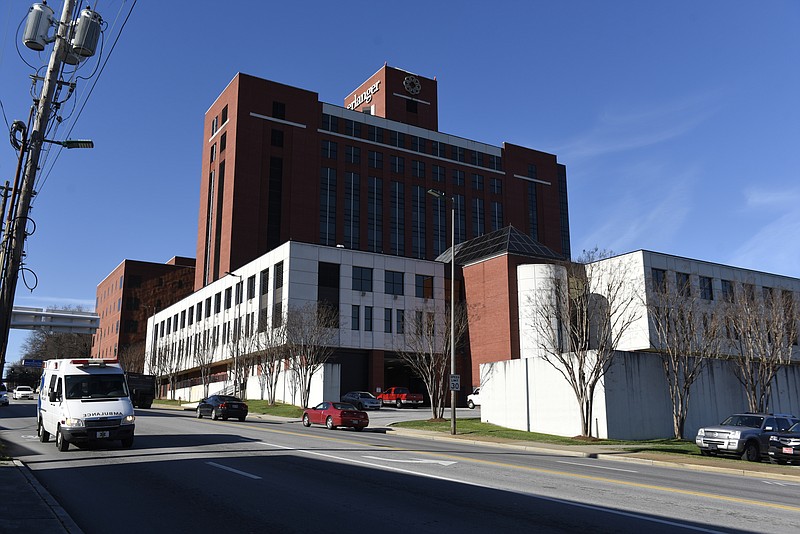With a growing presence in Southeast Tennessee, Erlanger Health Systems also is looking at expanding into North Carolina.
Erlanger is in talks to possibly buy, lease or manage the nonprofit Murphy Medical Center, comprising a 25-bed hospital, a nursing home, an athletic rehabilitation center and other facilities that serves about 44,000 people in western North Carolina.
Murphy administrators have said they're seeking a strong partnership in an increasingly fraught health care environment. And Erlanger CEO Kevin Spiegel said a relationship with Murphy fits the health system's mission.
"This is a very positive thing and we're excited about it," Spiegel said.
"Ultimately, our goal is to improve population health throughout the region, decrease the cost of health care and improve it at the same time," he said. "I think the exploration of this opportunity is clearly aligned to Erlanger's mission of being an academic tertiary referral source for our service area. We are the closest academic, tertiary hospital for adult, pediatric, trauma, stroke, heart care for Murphy - there's nobody else."

If the talks bear fruit - and both Spiegel and Murphy officials said they're still in the early stages - the North Carolina facility could join a system that includes Erlanger's main downtown hospital, a children's hospital and satellite campuses in Red Bank and East Brainerd, as well as a hospital in Bledsoe County.
The health system plans to grow its Sequatchie County clinic into a $25 million hospital, and it is partnering with Franklin, Tenn.-based Acadia Healthcare to build an 80-bed behavioral health hospital. Erlanger terminated its management agreement with Hutcheson Medical Center in Fort Oglethorpe in 2013. That tangled and unhappy relationship ended up in court, with a federal judge ordering Hutcheson to pay Erlanger $36.4 million. The case is now on appeal.
Murphy Medical Center CEO Mike Stevenson couldn't be reached for comment, but he told the North Carolina Health News in February the hospital needs to boost its revenue to stay healthy.
He said two-thirds of MMC's revenue comes from patients on Medicaid, Medicare and managed care, and that none of those cover the full cost of treatment. And, he said, MMC provided $14 million in uncompensated care last year. He told the North Carolina Health News the hospital's revenue after adjustments was $58 million and its expenses were $63 million in the past year.
Marketing director Paul DeMichael told the Times Free Press that MMC is in a generally good financial position but is looking for an infusion of cash to continue its growth. MMC is about half halfway through a management agreement with Carolinas Healthcare System, of Charlotte, N.C., but DeMichael said that agreement hasn't achieved one of the system's top priorities: attracting more medical providers.
"It's very difficult in a rural area like we are to attract and retain doctors," DeMichael said.
So MMC last year agreed to seek proposals from larger hospitals, and Erlanger submitted its proposal in February. DeMichael said Erlanger already supplies MMC's radiologists and its hospitalists - physicians who work in the hospital rather than keep a separate practice - and the arrangement has been "very well-received" in the community.
Spiegel said Erlanger Health System already has affiliation agreements with 15 hospitals in what he calls its "catchment area," a 150-mile radius outside Chattanooga, to share branding or quality expertise, leverage purchasing power or supply other needs.
He thinks this is a trend in the current health care environment. Just last week, struggling Copper Basin Medical Center in Polk County, Tenn., shut down its inpatient unit, laid off several nurses and started a GoFundMe page to raise money.
Copper Basin's chief financial officer, Tim Henry, wrote in the plea that the hospital "has fallen on hard times and in the ever competitive world of health care it is becoming increasingly harder for the smaller hospitals to compete effectively and efficiently!" As of Friday, $375 had been raised toward its $100,000 goal.
Spiegel said growing pressures in health care could drive more rural hospitals to seek strong partnerships.
"I think you're going to see consolidation throughout Tennessee of small hospitals aligning with larger hospitals," Spiegel said.
DeMichael said MMC administrators were hoping someone would offer to buy the hospital, but Erlanger proposed a 10-year lease, with a 10-year renewal. That doesn't include the nursing home, which MMC is trying to sell separately.
Spiegel said a lease is among the options the two organizations are discussing.
"We have not determined at this point the actual structure," he said.
MMC has recently been designated a Critical Care Hospital, meaning that its presence is considered essential in the community. That designation entitles it to higher reimbursements than it might receive from Medicare, Medicaid or managed care plans. That, plus revenue from selling the nursing home, will boost its cash flow.
Spiegel and DeMichael both said the due diligence process is still underway and neither expects a decision before late fall or the end of the year.
Jack Studer, president of Erlanger's board of trustees, said the group is aware of the negotiations and is awaiting details.
He thinks the idea of the partnership makes sense.
"We're already serving the region in a meaningful way, and I think this could be an exercise in understanding what that could mean going forward," Studer said.
Contact staff writer Judy Walton at jwalton@timesfreepress.com or 423-757-6416.
